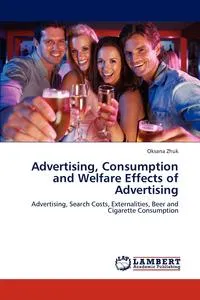Advertising, Consumption and Welfare Effects of Advertising
Автор: Oksana Zhuk
Переплёт: Мягкая обложка
📒 This dissertation consists of three essays. Two are empirical and one is theoretical. The empirical papers consider the relationship between advertising and beer consumption by young adults. We use the fact that numerous differences existed in the MLDA across states to analyze the effect of the minimum drinking age on the beer consumption. The second empirical paper analyzes the hypothesis that alcohol and cigarettes are complements and studies the effect of advertising, cigarettes consumption and government regulations on beer consumption by youth. We use time series market-level data to estimate the effect of advertising and demographic variables on the market demand for beer. The theoretical essay in this dissertation concentrates on the effect of advertising on welfare in the presence of search costs and negative externalities. It is possible that advertising will be oversupplied if it generates negative externalities. However, under some circumstances advertising can theoretically still be below the socially optimal level even in the presence of negative externalities. We explore those conditions.
Мнения
